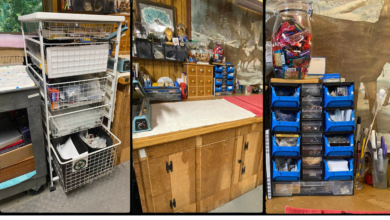
I’m sure when you were you were young, your mom or grandmother or other important caregiver freely gave their advice. Chances were strong that these visionary pearls of wisdom were handed down from earlier generations (or what was top of mind from the most recent “Good Morning America” episode.)
For some reason, my now favorite is the following hybrid version from an American television and film actor named Colin Cunningham. I had the simpler version engraved on a metal mug in 1976 when I was in retail. Yes, when leisure suits, loud silky shirts and colorful polyester pants ruled the flashy Disco Age.
“Be careful what you wish for because you will get it. Be even more careful what you work for because you will get it even more quickly.”
I’ve chronicled how my wife Nita and I purchased an existing sign company in Tyler, Texas, in 2006 and built it into a multi-million-dollar company with 33 employees. We were acquired in 2017 by Comet Signs, based in San Antonio, Texas, and we both continued in key positions of management and sales. It was the sobering juncture of opportunity and need. We knew we had to hitch ourselves to a ‘bigger star’ or go acquire another company. After buying two competitors over the years of ownership, we opted to be part of the company that took its name literally.
The last five years have been cosmic in growth (save that COVID year of 2020 we wish we could all forget.) We broke all kinds of records in 2022 and in December, my employer, (arguably the largest Texas signage company), announced the acquisition of the firm by Stratus, a leading brand implementation company that is one of the biggest in the United States plus serving 24 countries around the world. It looks like a great fit of two diverse puzzle pieces.
I wish I could take the credit of infinite visionary that unfolded over the last half decade. Who knew we’d buy a local 18-year-old company, grow it through a recession, build regional and national accounts from it then sell it in 2017? Or just become part of the current team for one of the top branding companies in North America with now 1,100 employees?
The answer of course, is you must be careful what you wish for. And be careful of what you work for because you might get it more quickly. As I now tell everyone, I wish I was 35 years old again!
Did luck play a part of this chain of events? Of course. Does God have a hand in the lives of everyday people? Undoubtedly. Skill, perseverance, aptitude, attitude, service, servant leadership, generosity, integrity and hundreds of other traits played a role, including one at the top of my list — being proactive. But do not underestimate belief in a vision. There’s a quote (I paraphrase) that always made me smile: “Visionary is a name given to successful people who didn’t listen when they were called delusional.”
Visionaries are not easily affected by the words or criticism of others, or their ideas would be short-lived and fruitless. You must have a powerful vision for the future. It can be something you want to contribute to the world, improve in life, or a legacy you want to leave. A relentless belief in a particular vision will not allow anything to cloud your focus.
A visionary may be a dreamer, but you can’t just sit around and daydream. Your actions are critical because wishful thinking is not enough. You must make goals and plans and be highly motivated to direct all energies to accomplishing your vision. Your worth ethic must be above average, and it will mean sacrifice. Most great visionaries never need pushing; they are self-producers and initiators.
There are many setbacks and disappointments running a business. To push through those times, a visionary must be happy and excited and have infectious enthusiasm. You must inspire when you do not feel like it. Be confident in your vision because others will look to you for guidance. Sometimes you are the rudder or compass of your organization. One of our great blessings was that we had a moral and religious compass we leaned on that was one of the original employees when we purchased our company. Her belief and faith were amazing to behold and impacted our decision making at just the right moment. We were fortunate to have her on our team for many pivotal years.
You must be open to try new things. A visionary is always willing to try or test something new. Occasionally, you will have to reinvent your company and manually change its trajectory. Change management is part of your critical thinking and you must be prepared to embrace it when needed. Ask your team for input and always engage a mentor by asking questions. You must become a problem-solver, flexible and be willing to act on new ideas. And do not forget to have the courage to leave things behind when changing your direction. Do not be afraid of change. It can be uncomfortable but keeping the status quo can be deadly for any company.
A key trait for a visionary is persistence. Visionaries live for a higher purpose and take such perseverance literally; they just never give up. Sports embedded that in me (along with some key caregivers and mentors.) Can you think of any visionary that let an obstacle stand in their way? We think of great visionaries who have made big achievements. There is no way any one of them would have let a setback dampen their spirit or stop their charge forward.
Visionaries are in it for the long haul. Sometimes their goals extend into years or decades. When you have an unwavering commitment to achieving your purpose, goal or vision you will do whatever it takes. Satisfaction comes partly from the journey and the ultimate impact of the completion of a vision. But the seed of a vision may germinate long before the vehicle presents itself. I yearned to be part of something great and the biggest in my field when I was in my early 20s starting my entrepreneurial career. It just took me many trials and errors to finally enter the sign industry in 1985. But my vision continued to percolate as my career unfolded. As time flashed by, it became more refined and detailed. As you get closer to fulfilling a vision (especially one that spans decades) your level of intensity, excitement and anticipation grows exponentially. Ironically, that often fuels your energy level when you need it the most.
What are some of the ideal personality traits or skills you need to prove you are a visionary? Being a realist is also important and to run a successful organization, we need both visionaries and realists. Each have their own mindset and they both see things in a different light. My wife Nita was the ideal realist and kept me in the present as I dragged her into the uncomfortable and unknown future. But that made a dynamic team and her skills of leadership, organization, employee coaching, operations, finance and everything else I lacked paved the way. Neither one of us alone could have made any vision a reality.
A visionary has foresight. They envision the future and talk about the “big picture.” They live in the future. They tend to think creatively and imaginatively about the present and its impact on the future. They are often calculating in one-, three-, five- and 10-year goals. Marketing is sometimes a passion of a visionary.
What sets a visionary apart from a realist? They often have innovative skills with great imaginations. They are transparent and not limited to their own thoughts and ideas. A visionary is open to what others say and they listen carefully to their ideas and thoughts. They are confident (and some may confuse that with being cocky.) Most visionaries are surprisingly focused on subjective information and not emotional. They decide with rational evidence and are logically driven.
These people can inspire others around them. They may have a “magical” quality. Visionaries are usually well-liked, have a lot of friends and know how to attract people. And they can make us passionate about their goal or vision when necessary.
They are good at teamwork and building teams. They like to be surrounded by positive people. Often, the visionary in your company is the best salesperson. They know how to embrace team members to balance their own weaknesses and use others synergistically to heighten creativity and new ideas.
Visionaries are usually great strategic planners and are skilled at presenting their goals and what they want the future to look like. They want the “buy-in” of the team to devise the strategies to get there. They are open to any input because they realize that any team member may have the magic bullet that solves a problem or idea that can change everything.
As you engage your quest to become a visionary and/or visionary leader, you may be afraid you lack the requisite foresight or creative juices needed. Some people have this innate in their DNA and others have had to develop the aptitude to anticipate the future. If you lack such natural talent, fear not, following are steps you can take to restoke the vision quest fire.
-
Ponder alternatives to your firm’s way of operating and explore possibilities for change
This can become a portal to seeing into the future. Break-through thinking may occur and sometimes the simplest, yet monumental advances may be revealed.
-
See your business from your clients’ or vendors’ point of view
This can be enlightening; it can open your business up to examining methods, procedures, or events that you don’t want to discuss. It can lead to better opportunities to create raving fans of your customers and to new product ideas, service offerings and other innovations. Don’t underestimate the importance of your vendor partners in molding your company.
-
Start to ask, “Why not?”
Just because something at first glance looks impossible and you have an immediate desire to say ‘no,’ get in the habit of asking, “Why not?” You might just discover revolutionary solutions you’ve never thought of previously. It’s easy to say “no” automatically because saying “why not?” takes us out of our comfort zone.
-
Leverage ideas from like-minded people
Be open in your thinking; it will help you understand better or provide new answers rather than the conventional easy ones. Strength and singularity of purpose can come from a group of focused individuals who are pulling together.
-
Let disparate ideas integrate into your way of thinking
This alone can create innovation. Sometimes innovation is only a remix of existing technology or methodology. A lone voice of dissent may prove to be a breakthrough that will help solve a problem even a visionary may miss.
Whether you are a natural-born charismatic visionary leader, an introspective and quiet visionary or a realist with some visionary tendencies, you are a critical part of the organization. You can get better at these traits by investing into self-improvement and reading about visionary people you’d like to emulate.
Sometimes, you must take your vision and announce it out loud. It’s like writing down a goal. It gives it life, meaning and purpose. Share it with the people that can help you achieve it. Encourage their input and let them help you map out strategies to make it happen. Sadly, many people live their entire lives without thinking their vision mattered or was even possible. Your vision matters. It is what make you unique. Proclaim it and see what happens. Be bold with your dreams, goals and visions. Be careful what you wish for! And even more careful of what you work for because it can come true very quickly indeed.




